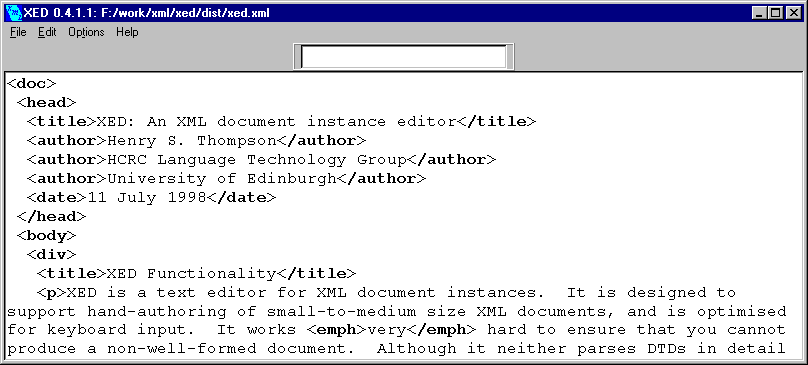XED is a text editor for XML document instances. It is designed to support hand-authoring of small-to-medium size XML documents, and is optimised for keyboard input. It works very hard to ensure that you cannot produce a non-well-formed document. Although it does not validate, the results of offline validation can be accessed, and it does read DTDs and keep track of your document structure, and provides context-based accelerators to make element and attribute entry fast and easy.
XED keeps track of all the changes you make in your document, so that you can undo changes, as many as you need to, if you make a mistake. This makes it easy to learn: if you're not sure whether a particular command will do what you want, just try it! If the results are not what you wanted, you can Undo them.
A non-exhaustive inventory of features provided by XED:
- Single-window WYSIWYG presentation
- Detailed error messages with line and character position information in case of well-formedness errors on input
- Add, remove and rename balanced start/end tag pairs and empty elements
- Add, remove and rename attribute name/value pairs
- Add or remove comments, CDATA sections and processing instructions
- Context-sensitive tag and attribute menus
- 'Smart' diagnosis of mixed versus element-only content
- Filling of text content, indenting of element-only content
- Structure-sensitive point-and-sweep selection paradigm
- Structure-preserving cut and paste
- Multiple undo
- Single-key movement into, out of and around elements
- Key bindings based on xxxPad under WIN32; based on Emacs under Unix
- Full UNICODE support

XED is based on the LTG's LT XML toolkit, and uses Python and Tk to provide an efficient and portable user interface. Some of XED's limitations derive from limitations of this substrate:
- Although you can see your declarations, you cannot yet edit them.
- Although documents with non-ASCII characters are correctly displayed and can be edited via menus etc., no typein method for non-ASCII characters is available.
.HLP files are now distributed as part of the WIN32 release,
and .html versions are in the UN*X release. If you're using
the latter, the help is here. Otherwise,
there's a (stale) version on
the web.
Beta versions of XED are available for trial evaluation and individual use. I will not be posting new release announcements as I fix bugs, but I will respond to all bug reports. This beta release, is available only as a self-extracting installation for WIN32 users.
- Windows 95/NT The preferred source is a self-extracting installation. The old flat zip file is no longer up-to-date. If you have ftp problems, try a slower http route to (a stale) EXE.
- Solaris 2.5 xed-solaris2.5.tar.gz (stale)
- FreeBSD (2.2.8, 3.2, . . .?) This distribution was built under 2.2.8 and tested under 3.2 -- should be pretty widely useable with recent version of FreeBSD: xed05-freebsd.tar.gz (stale)
- Linux Built under RedHat 2.2.5 (? I'm not a Linux person): xed05-linux.tar.gz (very stale)
A Macintosh version may be available in the medium term.
Please send all bug reports, suggestions for changes and enhancements, etc. to ht@cogsci.ed.ac.uk.
XED was produced in the Language Technology Group, part of the Human Communication Research Centre at the University of Edinburgh. Baseline funding for HCRC's work originally came from the UK Economic and Social Research Council: work on XED is now supported by LTG reserves.